Boiled Chicken for Cats: A Purrfectly Safe Treat or Potential Pitfall? (Vet-Reviewed Guide)
- 15 Apr 2025 11:00
As loving cat owners, we often look for simple, wholesome ways to treat our feline friends or provide easily digestible food during times of upset stomach. Plain boiled chicken frequently tops the list – it's meat, it's simple, and it seems inherently safe. This leads to the very common and important question: can cats eat boiled chicken? Is this straightforward preparation truly a healthy and safe option for our obligate carnivore companions?
The reassuring answer is generally **yes**, plain boiled chicken is one of the safest and most recommended human foods you can offer your cat, *provided* it's prepared correctly and given in appropriate contexts and amounts. However, crucial caveats exist regarding bones, seasonings, and its role within a balanced diet. This comprehensive guide, adhering to E-E-A-T standards (Experience, Expertise, Authoritativeness, Trustworthiness) and reviewed for veterinary accuracy, will explore the benefits, potential risks, correct preparation methods, and appropriate uses of boiled chicken for cats, ensuring you can offer this treat safely and effectively.
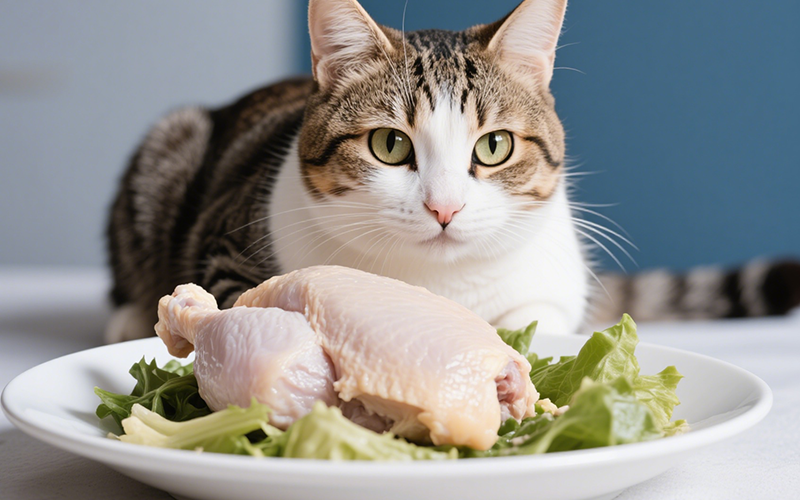
Feline Nutrition Basics: The Obligate Carnivore Foundation
Before diving into the specifics of boiled chicken, understanding a cat's fundamental dietary needs is essential. Cats are **obligate carnivores**. This means:
Their bodies are biologically designed to derive nutrients primarily from animal tissue.
They have high protein requirements, needing specific essential amino acids found abundantly in meat (like taurine).
Animal fats are a crucial energy source and provide essential fatty acids (like arachidonic acid).
They have limited ability to digest carbohydrates and no dietary requirement for them.
They need certain vitamins (like pre-formed Vitamin A) directly from animal sources.
Plain chicken aligns well with these needs as it's a source of high-quality animal protein and fats (depending on the part used).
The Benefits: Why Plain Boiled Chicken is Good for Cats (in Moderation)
When prepared correctly (plain, boneless, skinless/minimal skin), boiled chicken offers several advantages:
1. High-Quality, Digestible Protein
Chicken is an excellent source of lean animal protein, providing the essential amino acids cats need for muscle maintenance, tissue repair, energy, and overall health. Boiling makes the protein easily digestible, which is particularly beneficial for cats with sensitive stomachs or during recovery from illness.
2. High Palatability
Most cats find the taste and smell of plain cooked chicken irresistible. This makes it an excellent option for:
High-Value Treats:** Useful for training, rewarding good behavior, or simply as a special snack.
Appetite Stimulation:** Can entice cats who are picky eaters or those experiencing temporary appetite loss (always consult a vet first if appetite loss is due to illness) to eat.
Medication Aid:** A small piece can sometimes be used to hide pills (check with your vet if this is suitable for the specific medication).
3. Source of Hydration
Cooked chicken has a high moisture content (especially if boiled), contributing positively to a cat's overall hydration. This is beneficial as cats often have a low thirst drive and can be prone to dehydration, particularly if eating mostly dry kibble.
4. Controlled Ingredients
When you prepare plain boiled chicken yourself, you have complete control over the ingredients – ensuring no harmful seasonings, oils, or additives are included.
5. Foundation for Bland Diets
Plain boiled chicken is a cornerstone of veterinary-recommended bland diets used for cats experiencing temporary gastrointestinal upset (vomiting or diarrhea). Its digestibility and palatability make it gentle on the stomach while providing necessary protein during recovery. (Often combined with plain white rice in this specific context - see below).
These benefits make plain boiled chicken a versatile and generally safe option when used appropriately.
CRITICAL Considerations & Risks: How Boiled Chicken Can Go Wrong
While plain boiled chicken is safe, deviations from correct preparation or usage introduce significant risks:
1. **PLAIN Means PLAIN** - No Seasonings!
This is the most common mistake. Chicken prepared for human consumption is often seasoned, and many common seasonings are toxic or harmful to cats.
Onions & Garlic (Powder, Salt, Fresh):** HIGHLY TOXIC. Cause oxidative damage to red blood cells, leading to potentially fatal hemolytic anemia. Never use broth or water seasoned with these.
Salt:** Excess sodium is dangerous, straining kidneys and heart, and potentially causing salt toxicity (vomiting, diarrhea, tremors, seizures). Boil chicken in plain water only.
Oils & Butter:** Add unnecessary fat, risking GI upset and potentially pancreatitis.
Other Spices/Herbs:** Many can cause stomach irritation or have unknown effects on cats.
Rule #1: If feeding boiled chicken, it must be cooked in plain water with absolutely nothing else added.
2. **NO BONES** - Ever! Critical Danger!
This is a non-negotiable safety rule.
Cooked Bones Splinter:** Cooking makes chicken bones brittle and prone to splintering into sharp shards when chewed.
Severe Hazards:** These splinters can cause:
Choking (obstruction of the airway).
Damage to the mouth and gums.
Perforation of the esophagus, stomach, or intestines (leading to internal bleeding and life-threatening infections like peritonitis).
Intestinal obstruction.
All Cooked Bones are Dangerous:** This applies to all cooked bones, not just chicken.
Always use boneless chicken or meticulously remove every single bone *after* cooking and *before* shredding or serving.
3. Chicken Skin: Use Sparingly or Not At All
High Fat Content:** Chicken skin is primarily fat.
Risks:** While not toxic, large amounts of fat can cause:
Gastrointestinal Upset (vomiting, diarrhea, greasy stools).
Pancreatitis Trigger: High fat intake is a risk factor for pancreatitis, a severe inflammation of the pancreas.
Recommendation:** It's generally safest to feed boiled chicken without the skin. A tiny amount of skin occasionally might be tolerated by a healthy cat, but removing it is the cautious approach.
4. Thorough Cooking is Essential
While boiling typically ensures thorough cooking, it's worth noting the dangers of undercooked poultry:
Raw Chicken Dangers:** Raw chicken frequently carries harmful bacteria like *Salmonella*, *Campylobacter*, and *E. coli*. These cause severe food poisoning in cats and are zoonotic (can be transmitted to humans).
Ensure Fully Cooked:** Make sure the boiled chicken is cooked all the way through (no pink parts) to kill potential pathogens.
5. Nutritional Incompleteness - Not a Standalone Diet!
Plain boiled chicken, while providing protein, is **not nutritionally complete** for long-term feeding.
Missing Nutrients:** It lacks adequate levels of essential nutrients like calcium (leading to bone problems if fed long-term without supplementation), essential fatty acids, taurine (levels reduced by cooking/boiling), vitamins (like E, K, some B vitamins), and trace minerals.
Consequences:** Feeding only boiled chicken long-term will lead to serious nutritional deficiencies and health problems.
Role:** It should only be used as a **treat** (following the 10% rule - see below), a **temporary bland diet component** (vet-guided), or a **small topper** to encourage eating of a balanced main meal.
Specific Use Cases for Boiled Chicken
As a Healthy Treat
Tiny pieces of plain boiled chicken make an excellent, species-appropriate treat. Remember the **10% rule:** treats should not exceed 10% of your cat's total daily caloric intake to avoid unbalancing their diet and causing weight gain.
Appetite Stimulant
The appealing smell and taste can encourage a picky cat or one with a temporarily reduced appetite to eat. Mix small amounts with their regular food.
Bland Diet Component (Under Veterinary Guidance)
For cats with mild, uncomplicated diarrhea or vomiting, vets often recommend a temporary bland diet. This *may* include:
Plain Boiled Chicken:** Shredded or diced (boneless, skinless).
Plain Cooked White Rice:** (Optional, sometimes omitted depending on the cat/issue). Provides easily digestible carbs/calories and helps bind stool. The combination of **boiled chicken and rice for cats** is specific to this short-term therapeutic use.
Ratio & Duration:** Your vet will advise on the correct ratio (often starting rice-heavy), portion sizes, feeding frequency, and duration (typically only 2-5 days).
Crucial:** This is NOT a long-term diet. Consult your vet before starting a bland diet to ensure it's appropriate and to diagnose the underlying cause of the GI upset.
How to Prepare Plain Boiled Chicken Safely for Your Cat
Follow these simple steps:
Choose Chicken:** Select boneless, skinless chicken breast or thigh meat.
Prepare for Cooking:** Rinse the chicken if desired.
Boil in Plain Water:** Place the chicken in a pot and cover it with plain, fresh water. Do NOT add salt, oil, seasonings, onions, garlic, or anything else.
Cook Thoroughly:** Bring the water to a boil, then reduce heat and simmer until the chicken is fully cooked through (no pink remaining). Cooking time varies with piece size, typically 15-30 minutes. Internal temperature should reach 165°F (74°C).
Remove from Water:** Take the chicken out of the water (you can reserve the plain broth - see below).
Cool Completely:** Let the chicken cool down to a safe temperature.
Shred or Dice:** Cut or shred the chicken into small, bite-sized pieces appropriate for your cat. If starting with bone-in chicken (not recommended), meticulously remove ALL bones now.
Serve or Store:** Offer a small portion plain or mixed with food. Refrigerate leftovers promptly in an airtight container for up to 3-4 days, or freeze for longer storage.
What About the Broth?
The plain water used to boil the chicken becomes a simple, unseasoned chicken broth. This **plain broth** (ensure absolutely NO salt, onion, or garlic was added) can be safe and appealing for cats:
Can be offered in small amounts as a hydrating liquid treat.
Can be poured over dry kibble to add moisture and flavor.
Can be frozen into ice cubes for a cooling treat.
Discard if not used within a few days or if it smells off.
Can Kittens Eat Boiled Chicken?
Yes, plain boiled chicken can also be offered to kittens, but with extra care:
Nutritional Needs:** Kittens have even higher energy and specific nutrient requirements for growth than adult cats. Boiled chicken is even less suitable as a significant portion of their diet. Their primary food MUST be a high-quality commercial kitten formula (wet or dry).
Treat Size:** Offer even smaller pieces due to their size.
Introduction:** Introduce any new food slowly to avoid digestive upset.
Bones:** Be hyper-vigilant about removing all bones.
Focus on providing a complete kitten diet; use boiled chicken only as a tiny, occasional treat.
Expert Veterinary Opinion on Boiled Chicken for Cats
Veterinarians widely regard plain, cooked, boneless, skinless chicken as a safe and appropriate treat or temporary dietary component for cats. Key points include:
It's a highly digestible source of animal protein.
Crucial warnings are always given regarding **NO seasonings (especially onion/garlic)** and **NO bones**.
Emphasis is placed on it being **nutritionally incomplete** for long-term feeding.
It's frequently recommended as part of a **temporary bland diet** for GI upset, often with white rice, under veterinary supervision.
Moderation is advised when used as a treat to prevent dietary imbalance and obesity.
Cooking thoroughly is necessary to eliminate pathogen risks associated with raw chicken.
Summary Table: Cats Eating Boiled Chicken
| Aspect | Safety Information & Recommendations |
| Can Cats Eat Boiled Chicken? | **YES,** but ONLY if PLAIN, boneless, thoroughly cooked, and in moderation. |
| Benefits | Digestible protein, palatable, hydration source, good treat, base for bland diet (vet-guided). |
| CRITICAL Risks | **Bones** (Choking/Perforation Hazard), **Seasonings** (Onion/Garlic Toxicity, Salt), Raw Chicken (Bacteria), Nutritional Imbalance (if fed exclusively). |
| Preparation | Boil boneless, skinless chicken in PLAIN water until fully cooked. Cool, shred/dice small. NO additives. |
| Skin | High fat. Best avoided or fed in minuscule amounts occasionally to healthy cats. Risks GI upset/pancreatitis. |
| Use Cases | Occasional treat, appetite stimulant, temporary bland diet base (vet-guided). |
| Portion Size (Treat) | Small amount (few bite-sized pieces), max 10% daily calories. |
| Frequency (Treat) | Occasional, not daily (unless part of prescribed short-term diet). |
| Long-Term Diet? | **NO.** Nutritionally incomplete. Will cause deficiencies. |
| Boiled Chicken and Rice | Specific combination for temporary bland diet ONLY under vet supervision. Not a regular meal/treat. |
Quick Questions About Your Cat's Diet or Health? PettureX Offers Support!
Understanding the safe ways to offer treats like boiled chicken, or knowing when a bland diet might be appropriate (and when to call the vet!), is part of responsible cat care. If your cat has digestive issues or you have questions about specific foods, having access to quick information can be very helpful while you consult your primary veterinarian for diagnosis and treatment plans.
The PettureX App provides innovative tools for pet parents:
24/7 AI Vet Consultation: Get immediate AI-powered answers to questions like "How long should my cat be on a bland diet?" or guidance on symptoms like vomiting or diarrhea, helping you assess the situation anytime.
Image Recognition Technology: Useful for breed identification or getting preliminary insights into visible health issues.
AI-Powered Symptom Checker: Describe your cat's symptoms for an AI analysis of potential causes, aiding communication with your vet about GI upset or other concerns.
Comprehensive Pet Health Database: Quickly access information on feline nutrition, common illnesses, safe foods, and preventive care.
PettureX serves as a valuable digital resource, offering convenient AI-driven support and information to complement the essential, personalized care provided by your veterinarian.
Conclusion: Plain Boiled Chicken - A Safe Bet When Prepared Right
In conclusion, the answer to "can cats eat boiled chicken?" is a confident yes, making it one of the safest human foods to share *if prepared correctly*. Plain, thoroughly cooked, boneless, and ideally skinless boiled chicken is a highly digestible source of animal protein that most cats love.
The crucial factors are ensuring it is absolutely **plain** (no salt, oil, seasonings, especially NO onion or garlic) and completely **boneless** to avoid severe health risks. Remember that it's **nutritionally incomplete** and should only serve as an occasional treat (in moderation) or as a temporary component of a veterinarian-prescribed bland diet.
By adhering to safe preparation methods and appropriate usage, plain boiled chicken can be a healthy, enjoyable, and beneficial addition to your cat's treat repertoire or recovery plan.
Related
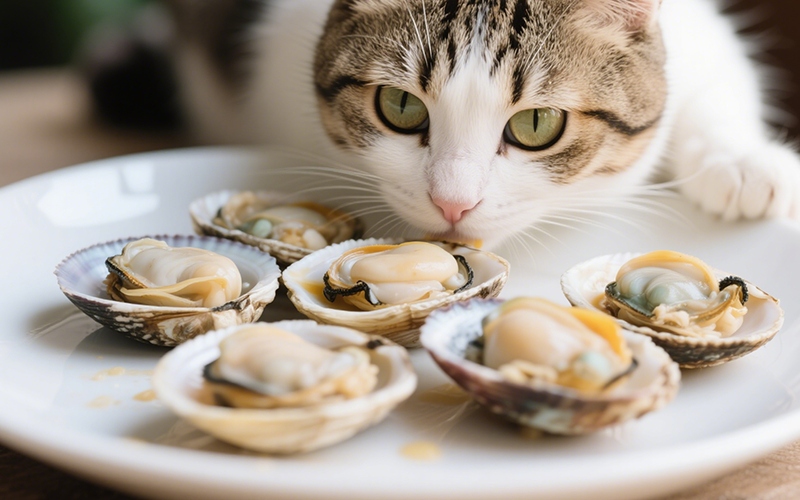
Seafood Surprise: Can Cats Eat Clams Safely? (Vet-Reviewed Risks & Guide)
- 15 Apr 2025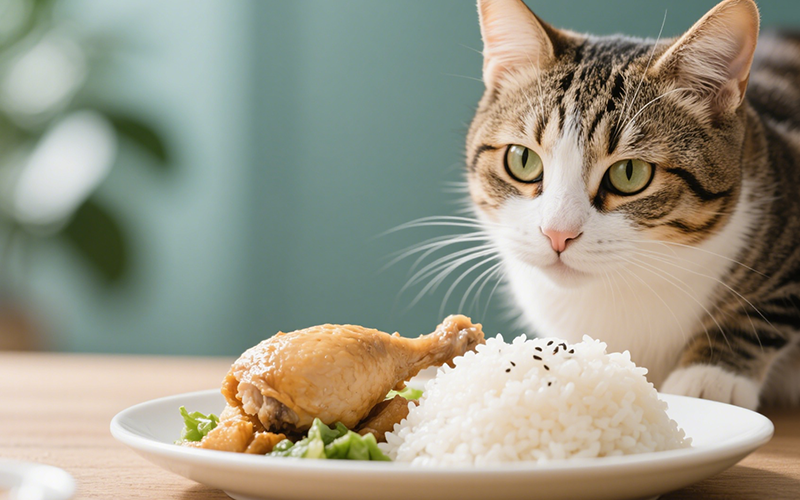
Chicken & Rice for Cats: Safe Treat or Dietary Danger? (Vet-Reviewed Guide)
- 15 Apr 2025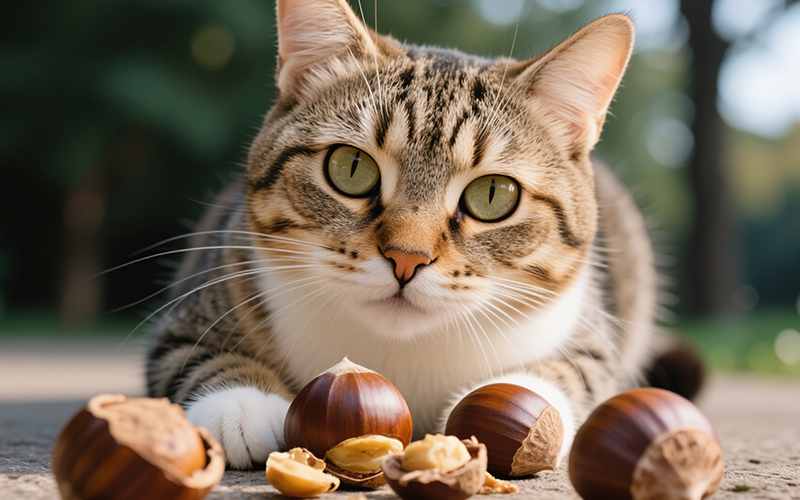
Nutty Concerns: Can Cats Eat Chestnuts Safely? Vet Explains the Risks (True vs. Horse Chestnuts)
- 15 Apr 2025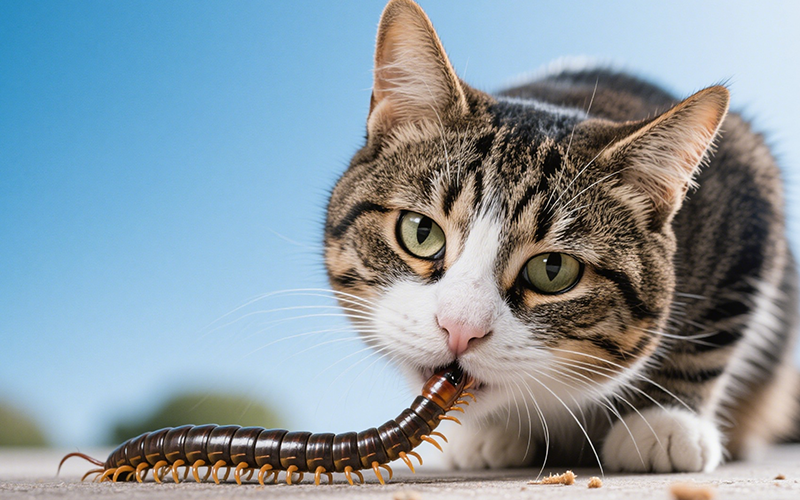
Creepy Crawly Cuisine? Can Cats Eat Centipedes Safely? (Vet-Reviewed Warning)
- 15 Apr 2025
The Gourd Guide: Can Cats Eat Canned Pumpkin Safely? Vet-Reviewed Benefits & Risks
- 15 Apr 2025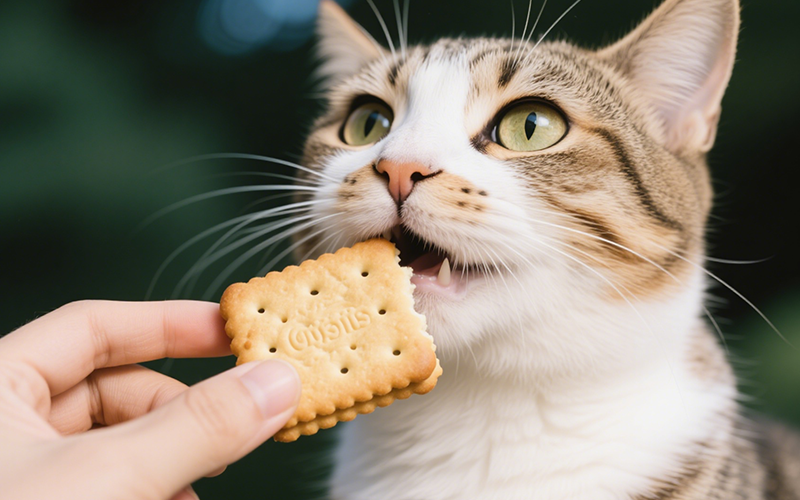
The Crumbly Truth: Can Cats Eat Biscuits Safely? Vet Warns of Hidden Dangers
- 15 Apr 2025
Beef Liver for Cats: Nutrient Powerhouse or Risky Treat? (Vet-Reviewed Safety Guide)
- 15 Apr 2025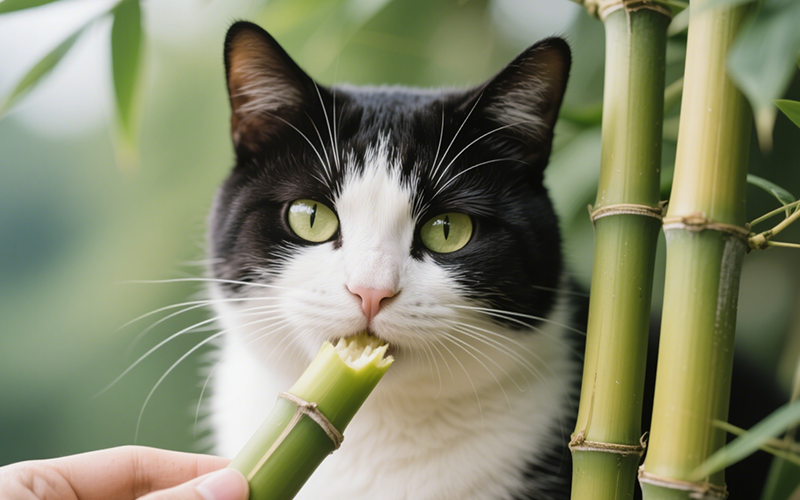
Green Stalks & Curious Cats: Can Cats Eat Bamboo Safely? (Vet-Reviewed Guide)
- 15 Apr 2025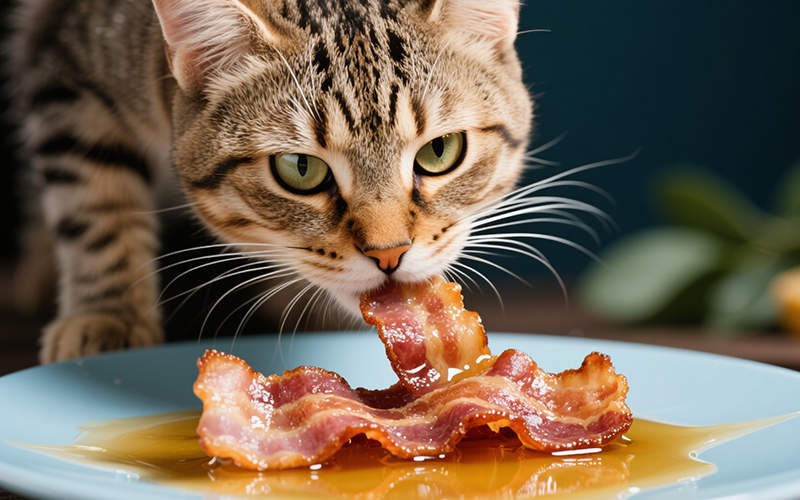
Fat Trap Alert: Can Cats Eat Bacon Grease Safely? (Vet-Reviewed Dangers)
- 15 Apr 2025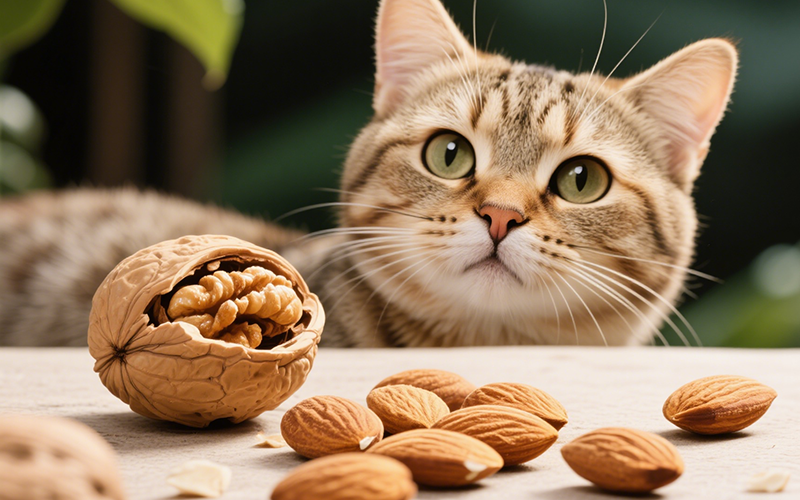
Nutty Notion or Nasty Nibble? Can Cats Eat Almonds Safely? (Vet-Reviewed Guide)
- 14 Apr 2025
